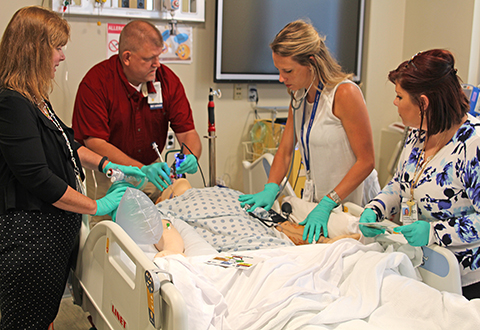VHA National Center for Patient Safety
Simulation Training Impacts Care at Truman VA

Clinical staff at the Columbia VA participate in simulation-based training as part of the High Reliability Hospital project.
In January 2015, the Harry S. Truman Memorial Veterans’ Hospital (Truman VA) partnered with the VA National Center for Patient Safety (NCPS) to participate in the Hospital of the Future project. One of our many goals is to provide Clinical Team Training (CTT) to 80 percent of our clinical staff. CTT takes the fundamental concepts used in high-reliability industries and applies them to health care. CTT focuses on teamwork, standard operating procedures and being preoccupied with failure.
For personnel to become proficient with the tools provided in CTT, it is necessary to practice in life-like situations. This is where simulation training comes into play. Simulation exercises provide a controlled, safe environment for employees to practice. During recurrent training sessions, employees get hands on experience with CTT tools and witness the benefits that come from appropriate utilization.
Over the past 18 months, CTT has proven to be useful in many aspects at our facility. The program introduces tools within the framework of the effective followership algorithm, which allows all employees to speak a common language, helping to break down communication barriers and improve patient care. Our employees are working together to meet common goals, consistently seeking opportunities for improvement and striving to provide safe, excellent care to our Veterans. To date, more than 550 employees have attended CTT.
To sustain the program, we have identified CTT master trainers across Truman VA to facilitate CTT (initial and recurrent sessions). Our master trainer team is made up of a wide variety of staff with clinical and non-clinical backgrounds: respiratory therapists, nurses, managers, physicians and administrative staff members. Each trainer has attended multiple CTT classes and has met various requirements to facilitate CTT.
One such requirement was to take a deep dive into the world of simulation, thus “Sim Boot Camp” was initiated at Truman VA in January 2016. During this two-day training, master trainers were coached on everything from the importance of simulation to the “[sic] how to’s” of creating and facilitating scenarios.
At the end of the boot camp, each master trainer had a working scenario – centered on real-life situations, that has presented numerous learning opportunities. In fact, one scenario stemmed directly from a Root Cause Analysis (RCA) conducted at Truman VA. By replaying the RCA scenario during simulation training, the lessons learned will be spread widely, leading to a lower frequency of similar occurrences in the future.
Additionally, all the scenarios created during Sim Boot Camp are compiled into an electronic simulation library that will be readily available for any master trainer to use in future simulation-based training. The skills learned in Sim Boot Camp will also allow master trainers to adapt scenarios to various departments and patient care acuity levels.
Sim Boot Camp participants have discovered opportunities for improvement in several of our current clinical processes. By walking through real life scenarios, recreated by way of simulation in a controlled environment, our team identified weak points in certain practices. We have found opportunities to improve upon them, preventing potentially adverse events from recurring. For example, while the team was walking through an acute care scenario, it was noted that debriefs were not occurring after code blue events. By simply bringing this discovery to key players, a systems redesign team took it upon themselves to complete a green belt project targeting post-code debriefs, connecting the dots between CTT and systems redesign.
Truman VA looks forward to con¬tinuing the simulation program and welcomes the many benefits it brings to staff members and to the care of Veterans. Because CTT has been widespread at Truman VA, a new common language has been adopted. Now, no matter where individuals venture in the facility, when they hear the phrases “What I see … What I’m concerned about … What I want …” a red flag goes up. People stop, listen and act. Patients’ needs are being met more efficiently every day. Huddles are taking place all over the facility and issues are being elevated in a timely manner by confident employees. Daily briefings have helped workgroups come together, striving to meet common goals. Debriefs have served to help identify and address opportunities for improvement.
Additionally, playing fields have been leveled to some degree by utilizing the effective followership algorithm, helping to harbor strong working relationships among employees. Bridges are being built between physicians and nurses, front-line staff and administration. Silos are breaking down between services. Transparency is on the rise. The pulse at Truman VA is changing!



















